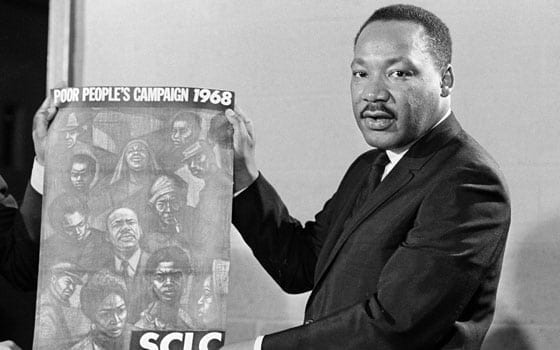


Civil Rights leader the Rev. Dr. Martin Luther King Jr., president of the Southern Christian Leadership Conference, displays the poster to be used during his Poor People’s Campaign on March 4, 1968. (AP photo/Horace Cort)
| On March 31, 1968, Dr. Martin Luther King Jr. discussed his planned Poor People’s Campaign from the pulpit of the Washington National Cathedral in Washington, D.C. “This is America’s opportunity to help bridge the gulf between the haves and the have-nots,” King said. “The question is whether America will do it. There is nothing new about poverty. What is new is that we now have the techniques and the resources to get rid of poverty.” (AP photo) |
EDITOR’S NOTE: On March 31, 1968, less than a week before he died in Memphis (where he went to support the city’s garbage workers on strike), the Rev. Dr. Martin Luther King Jr. spoke at the National Cathedral about the changes going on in the world, the challenges and opportunities they presented, and about the Poor People’s Campaign he was part of organizing. What follows are excerpts from his speech titled “Remaining Awake Through A Great Revolution.”
There is another thing closely related to racism that I would like to mention as another challenge. We are challenged to rid our nation and the world of poverty. Like a monstrous octopus, poverty spreads its nagging, prehensile tentacles into hamlets and villages all over our world. Two-thirds of the people of the world go to bed hungry tonight. They are ill-housed; they are ill-nourished; they are shabbily clad. I’ve seen it in Latin America; I’ve seen it in Africa; I’ve seen this poverty in Asia …
As I noticed these things, something within me cried out, “Can we in America stand idly by and not be concerned?” And an answer came: “Oh no!” Because the destiny of the United States is tied up with the destiny of India and every other nation. And I started thinking of the fact that we spend in America millions of dollars a day to store surplus food, and I said to myself, “I know where we can store that food free of charge — in the wrinkled stomachs of millions of God’s children all over the world who go to bed hungry at night.” And maybe we spend far too much of our national budget establishing military bases around the world rather than bases of genuine concern and understanding.
Not only do we see poverty abroad, I would remind you that in our own nation there are about 40 million people who are poverty-stricken. I have seen them here and there. I have seen them in the ghettos of the North; I have seen them in the rural areas of the South; I have seen them in Appalachia. I have just been in the process of touring many areas of our country and I must confess that in some situations I have literally found myself crying …
This is America’s opportunity to help bridge the gulf between the haves and the have-nots. The question is whether America will do it. There is nothing new about poverty. What is new is that we now have the techniques and the resources to get rid of poverty. The real question is whether we have the will.
In a few weeks, some of us are coming to Washington to see if the will is still alive or if it is alive in this nation. We are coming to Washington in a Poor People’s Campaign. Yes, we are going to bring the tired, the poor, the huddled masses. We are going to bring those who have known long years of hurt and neglect. We are going to bring those who have come to feel that life is a long and desolate corridor with no exit signs. We are going to bring children and adults and old people, people who have never seen a doctor or a dentist in their lives.
We are not coming to engage in any histrionic gesture. We are not coming to tear up Washington. We are coming to demand that the government address itself to the problem of poverty. We read one day, “We hold these truths to be self-evident, that all men are created equal, that they are endowed by their Creator with certain inalienable Rights, that among these are Life, Liberty and the pursuit of Happiness.” But if a man doesn’t have a job or an income, he has neither life nor liberty, nor the possibility for the pursuit of happiness. He merely exists.
We are coming to ask America to be true to the huge promissory note that it signed years ago. And we are coming to engage in dramatic nonviolent action, to call attention to the gulf between promise and fulfillment; to make the invisible visible …
One day we will have to stand before the God of history and we will talk in terms of things we’ve done. Yes, we will be able to say we built gargantuan bridges to span the seas, we built gigantic buildings to kiss the skies. Yes, we made our submarines to penetrate oceanic depths. We brought into being many other things with our scientific and technological power.
It seems that I can hear the God of history saying, “That was not enough! But I was hungry, and ye fed me not. I was naked, and ye clothed me not. I was devoid of a decent sanitary house to live in, and ye provided no shelter for me. And consequently, you cannot enter the kingdom of greatness. If ye do it unto the least of these, my brethren, ye do it unto me.” That’s the question facing America today.






